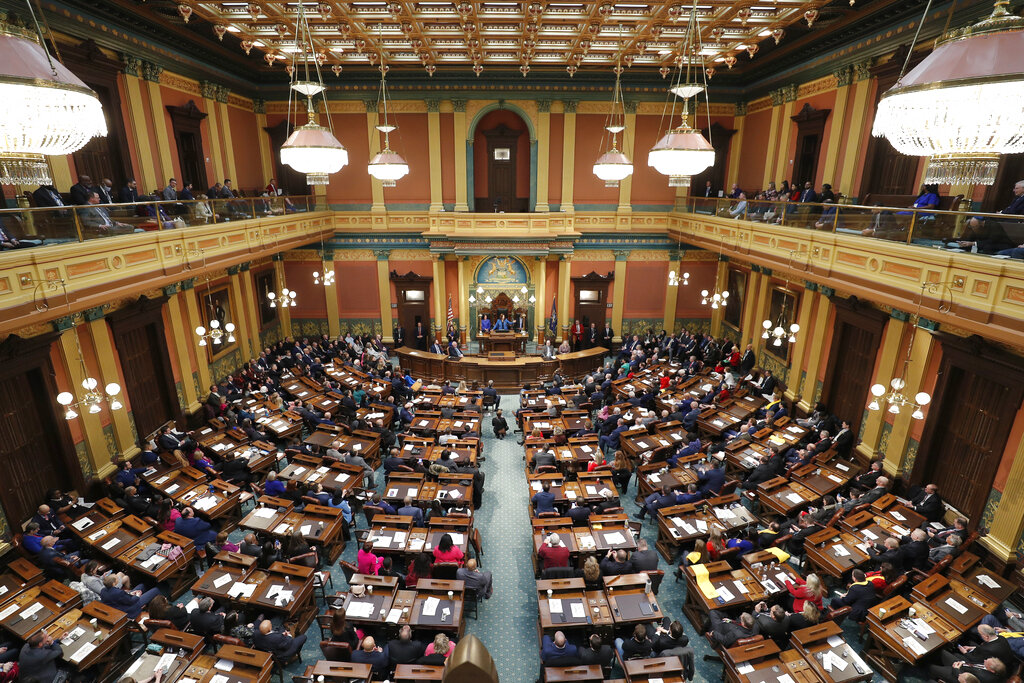The democratic-led House approved a repeal of the “right to work” law that was passed more than a decade ago, when Republicans controlled the Statehouse.
Supporters of the repeal cheered when the legislation passed along party lines on Wednesday night. But not everyone is happy about it.
Repealing the law, which prohibits public and private unions from requiring that nonunion employees pay union dues even if the union bargains on their behalf, has been a top priority for Democrats since they took full control of the state government this year.
On Wednesday, the House not only repealed Right to Work but also re-instated the Prevailing Wage.
ABC of Michigan is a statewide trade association representing the commercial and industrial construction. Spokesman Jimmy Greene tells 9&10 News they represent both union and non-union workers, and they believe both changes will hurt all workers. “We do have union contractors who believe in a fair and open competitive Michigan,” he says.
ABC MI “represents 88% of the commercial contractors here in the state of Michigan. So my job is obviously public policy and advocacy for those contractors,” Greene adds.
On the Prevailing Wage issue, he says that “prevailing wage isn’t a union versus nonunion thing, although people like to preface it that way because it makes for the sexier argument. But it isn’t. It’s really a taxpayer piece. We want the opportunity to be able to compete in a local community, for example, that just wants the real true cost of what it cost to build a public library, a public school, or any commercial building, for that matter.”
“Prevailing wage changes the mathematics of that by mandating what the wage has to be. That’s why I call it prevailing wage. It’s not the market wage. Or is it a fair wage? It’s a prevailing wage that literally is mandated by some artificial chart that the government creates,” Greene says. “We can (still) bid on prevailing wage work. It just seems unfair as a taxpayer that you’re getting nothing more from the extended dollar. You’re not getting any more timeliness. You’re not getting any more quality. You’re not getting more safety. You’re not getting anything more than an artificially inflated labor cost. I don’t think that’s fair at all.”
He says the same logic would upset homeowners.
“I think at the end of the day, before you put a shovel in the dirt, you’ve already mandated what the wage might be. I think every taxpayer would be incensed by that. I don’t know any taxpayer who would do that on their own private property. You know, just simply call up somebody and say, hey, listen, I want your highest price, irregardless of a fair quote. I don’t know anybody who would do that. But when it’s somebody else’s money, which is what the state is doing, it’s somebody else’s money. They can dictate those wages. And I think taxpayers should rebel against that mandate,” Greene says.
He also argues that repealing the prevailing wage was a good economic move in the past. “Since prevailing wage was repealed five years ago, wages across the construction industry have gone up. I would suggest that the repeal, the weight of prevailing wage was good for unions. The building trades unions in particular. So they made more money by having it repealed simply because they could compete more. And that, to me, that benefits every Michigan taxpayer. You have contractors, both union and nonunion, using the same supply chain, the same material costs, and essentially building with the same safety standards.”

Greene compares the Right to Work issue to voters passing Proposal 3 on abortion rights; saying it’s unfair to give people a choice on one issue, but not give workers a choice on whether to join a union.
“Right to work has never been anything more than a framework of a question. ‘Hi Bill. Would you like to be in the union as a condition of employment?’ Mandating that seems to be unfair for especially for a state that just passed Proposal 3, about choice, whether that’s an abortion issue or work issue. The state has set a precedent that it wanted choice except for that,” Greene says. “The idea that you can’t - or as a condition of employment you have to - belong to a union. Seventy percenter of the state just 10 years ago, mind you, said ‘no.’ They voted down that proposal. And the unions tried to embed it in the state constitution.”
Greene says time will tell how voters feel about both issues. “I think at the end of the day, each of these legislators are going to have to come back to their districts in two years and let the state representatives, the Senate is in four years, and they’re going to have to answer for these votes that they’ve taken. And quite frankly, I don’t think that’s going to be a pleasant response in two years. I you know, and I don’t want to be a dooms-dayer, don’t get me wrong, but it’s also unfair for me to be unrealistic about what I believe the outcome will be.
“And I don’t think it’s good for Michigan at all, which is ironic because they also passed social issues that made Michigan a better place from a diversity standpoint and made it less attractive from a business standpoint. So I guess the premise that they giveth and taketh away probably applied.”



